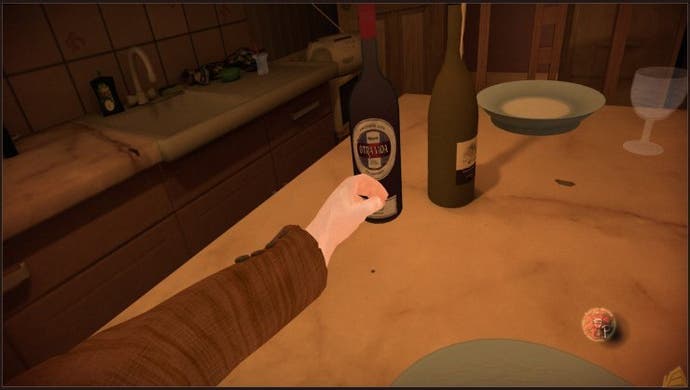When Is a Game Not a Game?
Why imposing a definition can prove problematic.
The release of two very different games in the last month, Asura's Wrath and Dear Esther, has sparked up one of gaming's evergreen topics: what is and what isn't a game? More than just a question of semantics, it's a pernicious and pervasive poser that can lead to all kinds of nastiness.
Take as an example the recent furore centred on Jennifer Hepler, a Bioware employee who made a remark in 2006 to the effect that games should cater to players who want to skip action sequences. Pretty reasonable, right? After all, L.A. Noire did it last year - letting players skip action sections they'd failed three times.
Hepler's comment was dug up and posted on reddit a few weeks ago, under the title 'This women [sic] is the cancer killing Bioware' and all sorts of horror followed - I'm not going to rake over the coals of that, but Kotaku's report is interesting both for the content and comments. Hepler's mistake was twofold: being a woman, and being right.
The former is a recurring point of shame across online communities. The latter is where things are less black-and-white. The non-odious arguments against Hepler's opinion are pretty similar to those used against Asura's Wrath and Dear Esther. It's a stance that prizes not just interaction, but a traditional kind of interaction (unfortunately usually defined as 'gameplay', a nebulous term) involving direct control of a character or on-screen events, and games that fall outside of these boundaries are... well, DVDs or something.

The crux of the argument against these non-traditional ways of gaming is this. We're looking, rather than leaping, stupefied by haunting visuals or sheer manga brash to such an extent we barely notice the 'lack' of interactivity. Which leads on to the endless topic of what interactivity is, and a separation of aesthetics and system for extended 'what if?' scenarios.
Strange thing is, Dear Esther isn't especially outré. Exploration games are simply a genre, one that incorporates all sorts of interesting extremes. Myst had puzzles, of course, but is clearly in the same lineage. At the other extreme of this category you get something like Suda 51's Michigan: Report from Hell, which casts you as a cameraman 'tagging' an environment for NPCs to interact with, more director than actor. And occasionally you get absolute gold like LSD, a PS1 game based around a dream journal kept by a developer for over a decade.
LSD is a first-person game that has you walking around bizarrely coloured environments that have the capacity to contain all sorts of weird things. You don't actually 'do' anything, except walk around and bump into surfaces or other characters - at which point the world morphs into another world. You can see the game in action, and even though it looks a bit rough now, the potential of this idea still shines.
Exploration is a fascinating genre, and one that cross-pollinates with other oft-derided breeds of games like Hidden Object - this latter genre, largely ignored by gamers and media outlets of all stripes, is incredibly popular both online and on markets like iOS and Android. Though dismissed for their simplicity of interaction, the best examples build resonant and mysterious worlds from the juxtaposition of setting and item, raising questions in the player's mind that take the place of traditional exposition, spurring them on to the next narrative clue.

Dear Esther doesn't have puzzles, but it does create that internal game for its players in fitting together the chunks of narrative and their implications. In games like these (and, as I've argued, Dark Souls) the player is a very active participant in 'creating' the world, because their role is to create a context for fragments - and in that juicy nether region of unknowing, the most fantastic things take shape.
That is an interaction devoutly to be wished, and the fact it doesn't depend on physically pressing buttons is irrelevant - your agency is what uncovers the pieces. The interactivity of Dear Esther has been questioned, but the fact that you're choosing where to look while its 'story' plays out is barely raised. That's not a small choice, but something so common it's barely noticed. It's as simple as this - Dear Esther's viewpoint is player-controlled, and that is one of the most empowering interactions a game can offer.
In the right context, limiting interactivity to a window on the world is one of the most powerful tools a designer has - especially in traditional genres. Take two of the most stunning moments from Modern Warfare. In the first, you're in control of US Special Forces soldier Paul Jackson completing a mission, when a nuke detonates. The next sequence has the player controlling Jackson in the aftermath, the ability to slowly crawl suggesting there's a way out, before it sinks in that he's dying.
Soon afterwards comes All Ghillied Up, a tense flashback where the player has to follow a commander's instructions to the letter, and any deviation is an instant fail. One of these scenarios teases the player's expectations of interaction - that there is always a way to 'win' - and the other achieves its effect by binding the player so tightly that every slight movement is supercharged.

Every time you try to exclude an interaction from 'gaming', something will pop up to prove it wrong. There are all sorts of mainstream games that don't fit any mold: Wii Fit; Seaman; You're in the Movies. Hell, why not throw Singstar in there? The brilliant Fruit Mystery is built around random choice and almost zero player agency - which it keeps on interrupting.
Interactivity has long since left mere buttons behind, never mind traditional ideas of how it should be implemented. I've played games with a headband that translated facial movements to control the on-screen view - imagine combining that with LSD (the game, I hasten to add). In the case of Sega's brilliantly-named Toylets your controller is a stream of piss. What can you say to that apart from bravo? There are games without visuals, from Papa Sangre on iOS to Deep Sea, which you play with a gas mask on. Ian Bogost's latest book references a game called Journey to the Wild Divine, where the input is the player's biometric data - to 'progress' at certain stages, your body has to be in a particular state of relaxation. Basically, it teaches you to meditate. I have no first-hand experience, but isn't that potentially brilliant? The question of whether it's a game or not doesn't matter. Who cares?
Does it work in the manner intended? Is it worth my time? Is it good? These are important questions. It could be Journey to the Wild Divine, Dear Esther 2, or Half-Life 3, but all that counts is how well the experience is delivered. An environment where boundary-pushing games are subjected to such fierce audience scrutiny is an environment where Microsoft Game Studios looks at a project like Milo and Kate and wonders if it's really worth investing in. That's the real tragedy. Everyone would claim they want an innovative industry, yet when something arrives that doesn't conform to a rather small set of preconceptions - well, those jumped-up developers better watch out, because here come the foghorns.

It is an oft-quoted truism that we're at gaming's beginnings, though what this means for us poor guinea pigs is anyone's guess. I'm certain of one thing: games, both in terms of aesthetics and interactions, will become far less literal. It's natural they've adapted techniques from other media, from cinematic angles to the narrative tricks of interactive fiction, and that the vast majority feature an avatar. But it is crazy to think that games always should, or will, be like this - and I personally cannot wait for a full-on abstract movement to arise, producing games that try to make their systems synaesthetic (like the cancelled Unity, intended to blend procedurally generated levels and acid music into a kind of tube shooter).
The 'is it a game' argument stops us having more interesting ones. Dear Esther is an experience that can certainly suck you in, and it's also hard to call it a fun one - an interesting area for some chin-stroking, perhaps, but before that we've got to spend paragraphs talking about why it is a game. The discussion is hijacked to no good end. Why does the topic rear its warty old head every time something new happens?
Coming up with arbitrary principles to trammel an evolving medium is pointless. We could play the definition game, but that's a merry-go-round of ever-expanding updates. Words eventually change their meaning to accommodate what actually exists, and the definition of videogame is no different. We the undersigned do not decide what is a game and what isn't - the people who make them do. Then we decide whether they're worth our money and time, or not. It's a simple equation.
If you refuse to admit certain experiences into the category of games, then that's fine - because plenty of us will. Gaming's self-professed guardians are fools, their arguments circular and trying to constrict a medium that grows ever outwards every day. Originals like Dear Esther and Asura's Wrath, even if they're not to one's taste, suggest possibilities for others that might be. Gaming is the winner. And the only loser, as with all things, is the naysayer.



-3-31-23-screenshot.png?width=291&height=164&fit=crop&quality=80&format=jpg&auto=webp)





